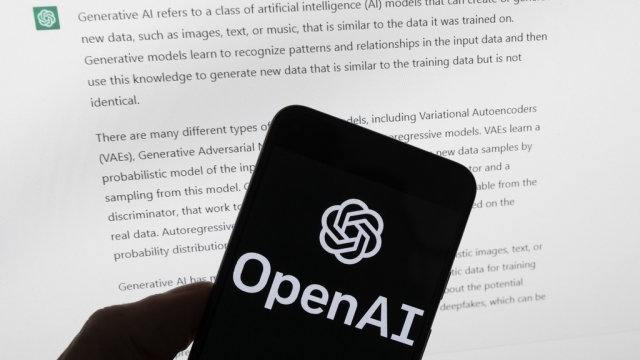Tech companies such as OpenAI, Google and Meta are facing lawsuits over alleged copyright infringement.
Actor Tom Hanks recently warned fans that a dental company ad included fake footage of him, produced using artificial intelligence.
Google recently assured its users that the tech giant would legally protect them if its AI tools led to more lawsuits.
The latest front in the AI wars is the fight over how intellectual property can be transformed by AI. For example, could someone take a video you own, alter it with AI, and claim they own the result?
Hundreds of thousands of lines of computer code are what make AI software so smart.
But what makes the things they make realistic are the billions of examples made by humans that the models rely on. "Generative A.I. systems, based on architectures like large language models, rely on being trained on very large datasets, datasets that a number of companies have basically gotten by scraping data from the Internet," says Ryan Abbott of the University of Surrey. "If you want to teach an AI that's based on machine learning how to write a book, one of the best ways to do that is to feed it existing books that have been published so it can essentially learn how to replicate that output," Ryan Abbott teaches at the University of Surrey. "And the more books you show in the model, the better the model may be able to engage in that sort of activity."
Which is what engineers behind several top AI models are alleged to have done. That's prompted several lawsuits, including one from the Author's Guild.
The stock photo site Getty Images, used by Scripps News, has also sued Stability AI, claiming that the firm's stable diffusion tool was illegally trained on Getty Images.
And comedian Sarah Silverman is suing both OpenAI and Meta. Silverman alleges in the OpenAI suit that the company's software copied her 2011 book "Bedwetter" and infringed on her copyright.Asking ChatGPT to summarize the first part of Silverman's book, and a user gets a detailed synopsis of it.
SEE MORE: AI image tools could incentivize racism, stereotypes and biases
But Abbott thinks that AI platforms using text to train come under the legal category of "fair use," which he says means it does not infringe on copyright.
"My view is that courts are probably going to settle on training, on copyright, predictive data being fair use, given that it is fair use for an actual person to train in that manner," he says. The issue, he adds, is the concept of content vs. style. "So if I wanted to write a new song in the style of Taylor Swift, you know, there's nothing other than my complete lack of musical aptitude that would prevent me from doing that...unless the specific work was substantially similar to a specific work of Taylor Swift's, in which case that work, if copied, might be infringing."
It's not just about intellectual property. Workers in the creative industries are worried that the emergence of generative AI could take their jobs. AI was central to the Hollywood writers strike earlier this year. The walkout ended when the entertainment companies agreed, among other things, not to require the use of AI for scripts.
And what about AI-produced images or footage that are based on real people?
"There are a variety of state laws that protect someone's name, image and likeness. So, for example, even though I might be able to have an A-I make a song in the style of Taylor Swift, I couldn't make a synthetic advertisement of Taylor Swift saying how wonderful my business was and use that in marketing without her permission," says Abbott.
Finally, there's another question. Should the output of AI models, like this artwork, receive government copyright protection?
Artist Jason Allen used the AI tool Midjourney to make the image, but the U.S. Copyright Office says because AI created most of the image, he can't copyright it since "Copyright can protect only material that is the product of human creativity."
Other images created with AI have received similar rulings from the government. Ryan Abbott disagrees with the copyright office. He has filed two federal lawsuits to allow AI-produced works to receive both copyright and patent protection. "This is inconsistent with the purpose of copyright law, which in the United States is to promote the generation and dissemination of creative works."
The U.S. House and Senate are considering new laws that could set the rules for generative AI and intellectual property.
But as the law tries to catch up with technology, the intersection of AI and intellectual property will only get more contentious.
Trending stories at Scrippsnews.com




